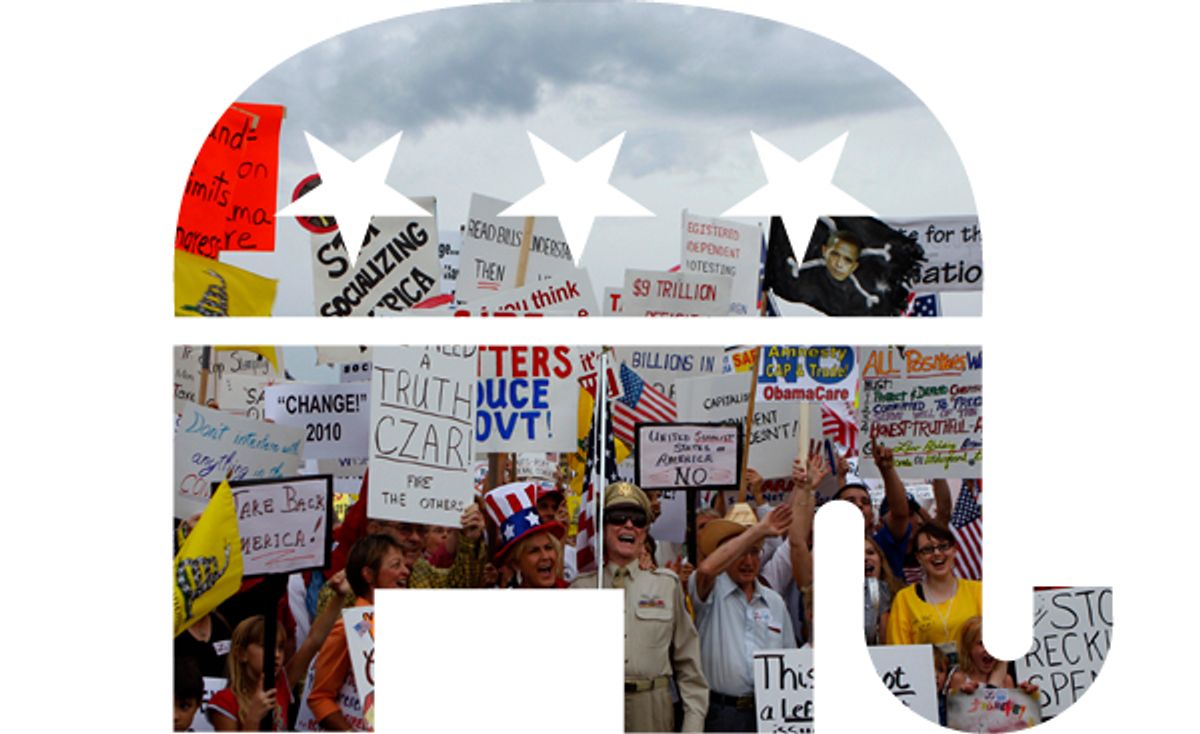A key question raised by the spread of Tea Party protests and the emergence of Tea Party candidates in numerous House, Senate, and gubernatorial elections is whether this movement represents a new force in American politics or whether it is simply the latest, and perhaps the noisiest, manifestation of the long-term rightward shift of the Republican Party—a shift that can be seen as part of a larger trend toward increasing partisan polarization in American politics.
While several million individuals may have taken part in Tea Party protests or contributed money to Tea Party organizations or candidates since the movement first appeared on the political scene in early 2009, these active participants clearly constitute only a small fraction of a much larger group of Tea Party sympathizers from whom the activists are recruited. I will concentrate here on describing Tea Party supporters among the American public by using data from a national survey conducted in June of 2010 by NBC News and the Wall Street Journal.
I used two questions from the NBC/Wall Street Journal poll to measure support for the Tea Party movement: one asking respondents to rate the Tea Party movement on a five-point scale with responses ranging from very favorable to very unfavorable and the other asking them to express their feelings about voting for a Tea Party candidate on a five-point scale with responses ranging from enthusiastic to very uncomfortable. Responses to the two questions were strongly related so I combined them to form a Tea Party support scale with scores ranging from 1 (least supportive) to 9 (most supportive). Overall, 18 percent of the survey respondents were classified as supporters of the Tea Party movement based on scores of 8-9 on the scale.
Tea Party supporters were overwhelmingly white, somewhat older than the electorate as a whole and somewhat more religious than the electorate as a whole. However, it is when we turn to political attitudes that the differences between Tea Party supporters and the general public become most striking.
Although some Tea Party leaders have tried to stress the movement’s independence from the Republican Party, supporters of the Tea Party movement overwhelmingly identified with the Republican Party and reported voting for Republican candidates. Eighty percent of Tea Party supporters were Republican identifiers or independents who leaned toward the Republican Party and 54 percent were strong Republican identifiers. And Tea Party supporters definitely were not political newcomers—93 percent reported voting in the 2008 presidential election and 96 percent of these Tea Party voters cast their ballots for John McCain.
With respect to ideology and issue positions, Tea Party supporters were far to the right of the overall electorate. Fully 84 percent of strong Tea Party supporters described themselves as conservative and 54 percent described themselves as very conservative while only 41 percent of all members of the public described themselves as conservative and only 20 percent described themselves as very conservative. And compared with the public, Tea Party supporters were also much more likely to take the conservative side on a wide range of issues including immigration, health care, offshore oil drilling, social security, eliminating federal agencies such as the Department of Education, and reducing regulation of major industries.
Given the intense opposition of Tea Party supporters to President Obama’s policies, the Tea Party movement is not likely to fade away as long as he remains in the White House. And since Tea Party supporters make up over a third of Republican identifiers and almost certainly make up a much larger proportion of active Republicans, the Tea Party movement clearly has the potential to strongly influence Republican congressional and presidential primaries in 2012. Any serious Republican presidential contender will have to find a way to appeal to Tea Party supporters. The danger, of course, is that this may make it very difficult for the eventual Republican nominee to appeal to more moderate swing voters in the general election.



Shares